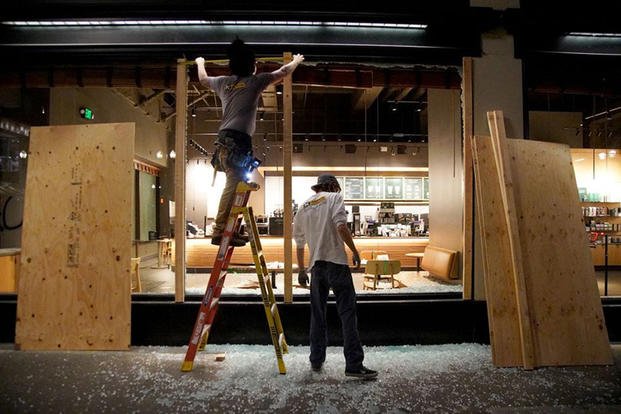The prosecution of a former Army officer facing a federal riot charge for allegedly smashing Starbucks windows during a 2021 demonstration in Portland has drawn accusations from his attorneys that the government has unfairly targeted him and used “highly questionable” tactics to build a case against him because he’s a “left-wing protester.”
Defense attorneys argued Wednesday that the FBI seized Kenneth George Harold’s cellphone from Portland police without a warrant and improperly reviewed his military personnel file without submitting a written request to the Army as required under the federal Privacy Act. They also contend Portland police destroyed Harold’s clothing and backpack seized during his arrest.
The government is selectively prosecuting Harold as a Black Lives Matter supporter while failing to investigate or charge far-right activists for local violence and property damage in Portland and its suburbs, Assistant Federal Public Defenders C. Renée Manes and Anna Marie Belesiotis allege.
“It’s clear to us that the federal government, we believe, was looking at Mr. Harold long before he was arrested that night,” Manes said during a hearing in U.S. District Court in Portland. “They did not go to the PPB and grab the cellphones of every protester arrested in Portland and yet they did with Mr. Harold. We cannot understand why.”
Federal prosecutors have declined to address the allegations raised by Harold’s defense. They will face upcoming deadlines to respond to any motions filed in the case.
Assistant U.S. Attorney Andrew Ho said in court only that the government made a formal written plea offer to Harold, but he rejected it. Ho didn’t disclose what the offer entailed.
Kevin Sonoff, a U.S. Attorney’s Office spokesperson, also declined comment.
The federal indictment against Harold includes what prosecutors allege are a series of texts he sent in the weeks before his arrest urging people on the streets in Portland to smash windows and damage property. It accused him of traveling from Washington state to Portland and inciting property destruction.
At the time, Harold was a platoon sergeant stationed at Joint Base Lewis-McChord in Washington state.
U.S. District Judge Karin J. Immergut moved back Harold’s trial date from June until Dec. 3 to allow time to consider the defense motions.
Harold is accused of breaking large glass windows at a downtown Starbucks on Southwest Morrison Street on April 20, 2021. That was the night of the verdict in the trial of Derek Chauvin, the former Minneapolis police officer found guilty of murder for killing George Floyd, a Black man who died after Chauvin knelt on his neck for more than nine minutes.
An undercover officer at the demonstration alerted uniformed police officers, who arrested Harold.
Harold was initially charged in Multnomah County Circuit Court with first-degree criminal mischief and riot, both Class C felonies, and misdemeanor possession of a graffiti implement. State prosecutors indicated in court records they could “not proceed” and dismissed the case that June.
Harold’s lawyer in state court filed a motion on Aug. 18, 2021, seeking the return of Harold’s seized property. The lawyer noted Harold needed the phone back before deploying to Korea.
A Multnomah County prosecutor opposed the motion, saying the property remained in Portland police custody because charges were still possible, according to Manes and Belesiotis.
But the phone actually was in the hands of the FBI, the two federal public defenders said.
They learned the FBI had taken the phone within a day of Harold’s arrest and started searching it immediately with no warrant, Manes said in court. The FBI eventually got a search warrant for the phone three months later in July, she said.
“Portland Police Bureau had no right to give it to the FBI,” Manes said. “The FBI immediately began searching it, immediately began looking at screens.”
Manes also said Portland police destroyed evidence in the case: Harold’s backpack, boots, gas mask and clothing seized when he was arrested.
Harold was indicted in federal court a year and a half after the protest in February 2023. A conviction on the felony is punishable by up to five years in prison.
According to the indictment, Harold sent text messages to people in Portland on his phone to egg on his contacts, starting two months before his alleged vandalism.
In one, he wrote that he felt “almost more comfortable” using a window-smashing tool “in pdx sense (sic) things go so crazy here all the time it’s normal,” according to the indictment.
On April 20, 2021, he boasted in another text message about vandalism in Northeast Portland the night before, “I’m happy we got their windows now!” referring to the smashing of windows at the Boys and Girls Club off Northeast Martin Luther King Jr. Boulevard, according to the indictment.
In another text on that day, according to the indictment, Harold texted: “It’s at the justice center I’ve always wanted to do one of those ones!! Those nights go insane!”
He is accused of causing $11,188.43 in damage that night at the Starbucks at 410 S.W. Morrison St.
In early May 2021, federal investigators interviewed Harold’s Army supervisors, who shared that Harold spoke about supporting the Black Lives Matter organization and felt police should use non-lethal means for arrests during protests, according to his defense lawyers.
The government obtained what appears to be a full copy of Harold’s military personnel file that same month, but federal prosecutors have refused to provide a copy of any written request made to get those records, according to Harold’s lawyers.
Manes said in court that she plans to file a motion to compel the government to turn over any written request, as required under the federal Privacy Act.
Harold separated from the military in May 2022, according to the federal indictment. It’s unclear what the circumstances were that led to the separation.
Manes and Belesiotis also signaled that they plan to file a motion to suppress evidence obtained from Harold’s cellphone and a motion to dismiss the charge against Harold, alleging selective prosecution based on political beliefs.
“This case raises a unique charge that is rarely — if ever — brought and which has the potential to be brought in a politically targeted manner that violates the First Amendment,” his lawyers wrote to the court. “The extreme focus on Mr. Harold by federal law enforcement when he was just a single protestor among hundreds that night, and thousands over the course of months, cannot readily be explained.”
Most other cases involving similar conduct — damage to private property during a protest — have been resolved with pleas to misdemeanor charges in state court, they wrote. And in those cases, after the defendant pays restitution and follows supervision conditions for a year, the plea is withdrawn and the charge dismissed, they said.
They cited examples, including the Multnomah County prosecution of Nicole Rose, who was accused of smashing the windows of the Democratic Party office during a 2021 protest in Portland. Her case was dismissed in March 2023 after she met those conditions.
Even when charges involved more serious conduct such as assault on a police officer or significant damage to public property, state court resolutions have generally allowed for an eventual misdemeanor resolution, Harold’s lawyers said.
© 2024 Advance Local Media LLC.
Visit oregonlive.com.
Distributed by Tribune Content Agency, LLC.
Story Continues
© Copyright 2024 oregonlive.com. All rights reserved. This material may not be published, broadcast, rewritten or redistributed.
Please rate this CIBA article
Vote






